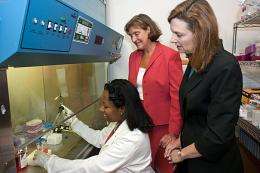Hunting the missing health link

Researchers at Harvard-affiliated Brigham and Women's Hospital and Harvard Medical School have embarked on an ambitious study of the link among genetics, lifestyle, environment, and health that organizers hope will set the stage for a new generation of personalized disease analysis and medical care.
The study, called OurGenes, OurHealth, OurCommunity, eventually wants to enroll 100,000 patients in a lengthy, longitudinal study of the causes of illness that could help link genetic background to lifestyle and environmental factors.
The study stands on three key parts: patients’ health backgrounds, which are provided to researchers through existing health records, family histories, and medical questionnaires; their genetic profiles, which are provided through blood samples; and their health futures, which are mapped through access to clinical data as it accumulates.
Christine Seidman, the study’s co-principal investigator, the Thomas W. Smith Professor of Medicine and professor of genetics at Harvard Medical School, and director of the Brigham’s Cardiovascular Genetics Center, said she views the study as a community effort in which Brigham medical workers and patients come together to help realize the promise of advances that have been made in recent years in understanding genes.
The study, which is in an initial, yearlong pilot phase, is enrolling patients at six Brigham-affiliated sites. Because of the consent, family history, and questionnaire process, she said the OurGenes staff is using the trial period to ensure that data gathering does not interfere with the clinical purpose of patient visits and also to make sure the enrollment process itself is capturing the diversity of patients.
So far, Seidman said, about 100 people have enrolled in the study. The participation rate is about 70 percent of those approached and asked if they’re interested. Instead of waiting for patients to come to the hospitals or clinics, Seidman said, patients with appointments are mailed information a couple of weeks in advance of their appointments so they are aware of the study before being asked to participate. The information that is collected will be kept private.
Seidman said healthy patients are as important to the study as people with medical conditions. Those with one condition can be part of a control population for studies that look at others. “If you’re perfectly healthy, you’re as valuable to us as someone with a devastating condition,” Seidman said. “We all have risk for some disease and less risk for others.”
Seidman sees the study as long running, since it will take years to get the patient population enrolled, and the plan is to follow patients through time and monitor health outcomes. The study will gather information on topics as diverse as patients’ smoking history, their exercise practices, sun exposure, and even where they grew up. Examples of questions that researchers are hoping to answer include whether specific genes, in combination with certain lifestyle or environmental factors, lead to greater health risks and whether certain drugs lead to adverse reactions in patients with specific genetic profiles. Though the study was launched only in June, researchers are already expressing interest in identifying a patient population that is taking statins, the popular cholesterol-lowering drug.
The accumulated health data, when combined with stored blood samples for genetic analysis, will also aid future researchers, who will be able to begin studies quickly and more efficiently than if they had to begin recruiting subjects from scratch, Seidman said.
Though other studies have been conducted examining the genetic background of disease, most of those have been aimed at specific ailments, specific populations, or specific genes. OurGenes is one of the first to examine such a large, diverse population for broad health and genetic trends.
















